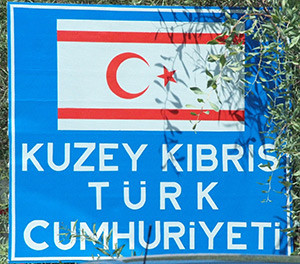Cyprus, an island near Turkey and Syria of roughly 1.3 million inhabitants, finds itself on the cusp of momentous change. As it belatedly makes its grand debut on the world stage after domestic Greek-Turkish communal issues have consumed its first 51 years of independence, it faces both great opportunity and great danger.
 The "Turkish Republic of Northern Cyprus" controls 37 percent of the island's land area. |
Cyprus was hardly the only territory rife with ethnic tensions that London eventually abandoned in frustration – think of India, Iraq, Palestine, and Sudan – but it was the only one where it retained a permanent role for itself and brought in patron states, namely Turkey and Greece, as guarantors of the newly-independent state.
This mischievous arrangement heightened tensions between both the two island's two communities and their patron states. Those tensions boiled over in 1974 when Athens attempted to annex the whole of Cyprus and Ankara responded by invading the island, seizing the northern 37 percent of the island's territory. Greek annexation fizzled but the invasion led to the establishment of a nominal "Turkish Republic of Northern Cyprus" (TRNC), which is maintained today by some 40,000 troops from the Republic of Turkey. Hundreds of thousands of settlers have since emigrated from Turkey, fundamentally altering the island's demography.
Cyprus remained thus for 35 years, divided, deadlocked, and largely ignored by the outside world, until two recent developments upended the island's obscure if unhappy status quo.
 The Noble Corporation's Homer Ferrington rig, built in 1985, has begun drilling in the Aphrodite gas field off Cyprus. |
Second, the June 2010 discovery of gas and oil reserves ("Leviathan") in Israel's Mediterranean Sea exclusive economic zone, right near the Cypriot EEZ, suddenly made Cyprus a player in the world energy market. Cypriots talk of 300 trillion cubic feet worth US$4 trillion. Such numbers attract covetous gazes, especially from Ankara, which demands (via the TRNC) its share of future gas income. Further, the AKP's escalating anti-Zionism combined with Foreign Minister Ahmet Davutoğlu's strategic ambitions suggest Turkish claims extending to Israeli-controlled waters.
In conjunction, these two developments – growing Turkish ambitions and possible gas deposits in the trillions – link Cyprus and Israel in self-defense. Leading Greek Cypriot figures in the government, the media, and business told me during a just-concluded trip to the island about their urgent wish to build economic and security relations with Israel.
 The Piri Reis, Turkey's only maritime research ship, is being escorted by Turkish naval ships as it trolls the Cyprus exclusive economic zone. |
In the security realm, several interlocutors proposed a full-on alliance with Israel. Cyprus would gain from Israel's much greater military, economic, and diplomatic prowess. Israel, which has already made protective efforts on behalf of Cyprus, would benefit from access to an airbase at Paphos, 185 miles (300 kilometers) from its shore, belonging to a European Union member.
Such an alliance would terminate the Cypriot legacy of non-alignment and low-key diplomacy designed to convince governments not to recognize the TRNC, though that strategy, arguably, has not brought it much benefit.
In the face of an over-confident and possibly messianic Turkish leadership that increasingly betrays rogue attributes, Washington, Brussels, Athens, and Moscow have important roles to play in encouraging Cypriot-Israeli relations and thereby diminishing the likelihood of AKP-led Turkish aggression.
Mr. Pipes (www.DanielPipes.org), president of the Middle East Forum and Taube distinguished visiting fellow at the Hoover Institution, recently visited Cyprus to deliver the Thoukidides Think Tank's inaugural lecture. © 2011 by Daniel Pipes. All rights reserved.
Dec. 28, 2011 update: Noble Energy today announced about its activities in Cypriot waters that "Results from drilling, formation logs and initial evaluation work indicate an estimated gross resource range of 5 to 8 trillion cubic feet (Tcf), with a gross mean of 7 Tcf."
